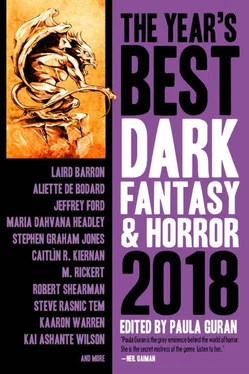He had no ladder, but he could slide the bed into the corner. From there it was a simple matter of standing and pushing the panel up and to the side, and then the strenuous but doable labor of leveraging himself up into the darkness.
He saw no treasure, but copious amounts of dust. Much of it had accumulated into furry mounds in the corners. He caught a glimpse of daylight, and shifting himself for a better view saw that a corner of the attic had been damaged, rotted out all the way to the outside air, ragged as if chewed.
Long, coarse hairs from the mounds glistened, moved. Then one of them shuddered, and a ragged gap in the middle opened wide.
Simon dropped back onto the bed, hastily fitting the panel back into place. Over the next hour he rummaged through the junk in the closet, finding a few strips of metal he could screw into the panel’s edges and secure it to the ceiling. He slid his bed back into the middle of the room and lay there watching the fastened ceiling panel. At one point the metal strips might have wiggled, but that might have been his eyes and nerves fraying from staring too long. Outside the teens ran around the house—he could imagine bands of them looking for trouble, or was it the pets they’d left behind? He was too old and too nervous for this. Tomorrow he would hike out of here and visit his cousin. Thank you and sorry and thanks but no thanks . He wasn’t sure if he’d tell him what he’d seen and heard. Old men had been locked away for less. He fell asleep pondering if there was anywhere else to go, and dreamed of being dragged screaming from his bed.
But he woke up still in his temporary house and on his temporary bed. The ceiling panel remained safely in place. What was different was the redness of the room, as if Simon were seeing it through a veil of blood. He shook his head and rubbed his eyes. The intense redness still permeated, brighter near the window. He slid off the bed and fumbled the curtains aside.
A glorious scarlet sunset had swallowed the world and retrieved the tall old grandfather and grandmother houses from his childhood. The residents were outside shouting their enthusiasm as they walked toward the center of the development where the air was brightest, as if the sun were descending at that moment into their neighborhood. He could see little more than their rapt and shiny faces, the rest looking thin and dark as lamp black. His eyesight was clearly fading. He knew he would see nothing of the new world now.
He wasn’t sure what to do but couldn’t bear the thought of remaining in this cramped little hovel with all that human activity going on outside. Why had they hid themselves away from him? One glimpse from their hiding places should have told them he had neither the inclination nor the ability to do them any harm. And with those things in the attic he felt safer outside. He jerked open the door and hurried out, determined to get a good look and become a part of whatever was to come.
A few of the neighboring ranch homes appeared unchanged, but as Simon followed the stragglers toward their brilliant destination he saw that the remainder had gradually warped into two stories or three or four, the walls stretched vertically thin to transparency, as if they were decaying upwards into these phantom rectangles with deteriorated regions allowing the night sky to show through. In some places a bright oblong of window appeared to float high in the air with a shouting person inside, with no discernible supporting structure around it.
He turned to the rioter next to him to share his amazement—it was an old man gone to crumbling cinders from his ribcage down.
Turning the corner he came face to face with the blackened crisp remains of youth gangs, shouting and punching those around them even as they had fingers and limbs flaking off. At the block’s center a hollow building displayed a boiling fire inside, dozens of those furry bodies exploding out from its blazing core like flaming cannonballs fashioned of fur.
They had their dirty, dirty hands all over him, their sooty clothes reeking of smoke and booze and the stench of new-fangled habits. He tried to reason with them but discovered he no longer spoke their language. There was nothing he could do, it seemed, and when they dragged him into the flames he found he no longer wished to resist.
Graverobbing Negress Seeks Employment
Eden Royce
I pried apart the corpse’s lips, their slackness telling me she’d been dead more than two days, and worked the tip of my finger inside her mouth. It opened enough for me to wedge the funnel in, its tip clinking on her teeth. I tipped my porcelain-lined hip flask—metal was a no-no—to spill the tea into her mouth. She didn’t have to swallow; enough would make its way down for the magic to work. I leaned back from the shallow hole she lay in, my aged joints protesting something fierce, then recapped the hip flask before hiding it away with the funnel inside my stocking. Wasn’t nobody looking up these skirts.
Tonight was kind. The temperature along Charleston harbor had dropped, creating a soupy fog the moon couldn’t quite cut through. Enough light to see my way home, but too little to give busybodies a clear view. My ear was always open to the rustle of feet or the clop of hooves approaching, except I wouldn’t have to worry about avoiding carriages tonight—those horses’ eyes weren’t good in the dark no way. Even so, I looked around me as I crouched on the pile of fresh turned dirt next to her, waiting.
She stirred. A brief jolt like she’d been run through with a tease of lightning. When her eyes opened—the first thing they all did was open their eyes—they were just starting to turn milky. I took her hand and helped her rise from the pit she’d been thrown in.
“Come on, honey. Maybe in your next life, you’ll learn to pick better men.”
Her dress was ripped, exposing one small breast; her hem was stained stiff with blood and fluids. Did the best I could with arranging the little coils of her hair to cover the angry rope burns around her neck and the hole in her skull, ’cause tea don’t fix everything. I wrapped my cape around her narrow shoulders and leaned her back against a tree while I filled in the hole. Then we started walking, her with an awkward bow-legged hobble and me not much better.
Chilled wind blew in, clearing the dense blanket of fog, and I hurried our steps. A hurricane lantern burned in the back window of one of the little shotgun houses off Maple Street and we headed toward it, avoiding the backyards because of the dogs yowling, torn between the need to protect their territory and their fear of the dead. I tapped on the closed screened door with a ragtime rhythm and after some scrabbling and heated whispers, it opened.
“Oh, thank you, Jesus.” The woman inside, young-looking with old eyes, sagged against the uneven doorframe when she saw the pair of us. Her man stood behind, large and silent and watchful.
“You got a place for her to be?” I asked. The effect of the tea wouldn’t last forever and having a dead body lying around wasn’t good for no one, especially not Colored folk.
“Baby?” the woman asked.
The girl turned toward the voice. “I’m so sorry, Mama.” The words came out thickened and slow, pushed past the decaying tongue. The girl’s mama broke down, sobs wrenching from her throat as she pulled and tore at the scarf covering her head.
Her man came to her, took the woman and her daughter each by an arm and led them to a sturdy, homemade table. He set a kettle on the stove to boil, then slid my cape off the girl’s shoulders, folded it, then returned it to me. As he pressed coins into my hand, he said, “Reb Fielding got a special little place for her to rest in the St. Matthew graveyard now that she home.” His eyes skitted away from mine. “How long we got?”
Читать дальше












